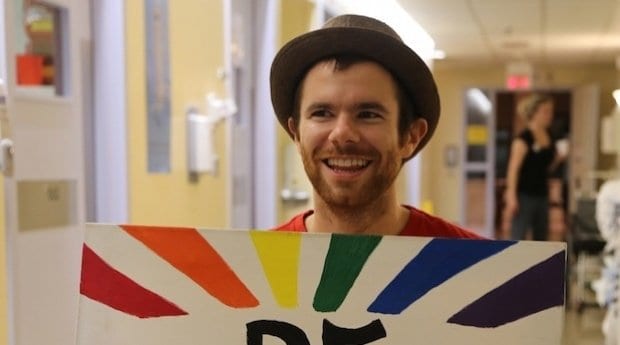It was the kind of crime that many of us like to think doesn’t happen in Canada. On Oct 12, 2013, Scott Jones, 28, had just left a bar in New Glasgow, Nova Scotia, when he was attacked from behind, stabbed twice and slashed in the throat.
The attack severed his spinal cord, leaving Jones, a passionate musician and hiker, paralyzed from the waist down. His attacker, Shane Edward Matheson, was later charged with attempted murder.
On June 12, 2014, a Nova Scotia judge sentenced Matheson, 20, to 10 years in prison. Though courts did not treat it as a hate crime, Jones, who is openly gay, has maintained that he believes the attack was motivated by homophobia.
Following his attack, Jones experienced an outpouring support from the community, including fellow Mount Allison University alumni, members of the LGBT community across Canada, and such high-profile people as Colonel Chris Hadfield.
With the help of close friends, Jones established the Don’t Be Afraid Campaign to combat homophobia. A website set up in support of Jones has raised $197,173 to date to help offset his medical costs. Most recently, he served as grand marshal in the Halifax Pride parade.
“It’s been a whirlwind,” Jones says, reflecting on the nine months that have passed since the night he was attacked. “Obviously, one of the most intense years that I’ve ever had.” He says that the experience has been a surreal one and that he sometimes has to remind himself that it actually happened to him.
“It’s weird because it was so horrible what happened to me, and I have a lot of emotions associated with that. But then the response has been overwhelming and people have just been so supportive.”
Despite the severity of his injuries and the prospect of never walking again, Jones says he didn’t have a lot of opportunities to feel angry or depressed. “There were moments, but when there’s so much love around you, at least this is the case for me, it was near impossible to hit rock bottom . . . if I was ever having a really bad day, I was never alone with that.”
In the aftermath of his attack, Jones and some of his close friends created the Don’t Be Afraid campaign. What started out as a small pin quickly became a movement with a social media presence and thousands of supporters. Jones says he wanted to provide a forum for people to talk about homophobia from both ends of the spectrum. Above all, he wanted to combat the fear he feels is at the root of it.
“[We wanted to] try to identify with the fear of the homophobic individual and realize that it is just fear and that it’s something that can hopefully be talked through,” he says. “I think you have to be a very scared individual to stab someone.” The campaign uses theatre, art and music to explore the feelings around homophobia, running events that include visits to schools.
In the early days after the attack, Jones’s prognosis was that he would never walk again. But in the months that followed, he says, his condition improved greatly. “I have some muscle function below the level of injury, and so that meant that I could start walking with long-leg braces, and so I did.”
He says he is cautiously optimistic about his situation, lauding the efforts of the Nova Scotia Rehabilitation Centre. “I’m very hopeful, but I’m also realistic.”
Jones says that continually reminding himself to be present and aware of the situation helped with his recovery. “With any type of trauma, I think we tend to want to just push it down and deny that it’s happening,” he says. “I was really afraid of doing that, so I would always be saying, ‘This is happening,’ to try and avoid disbelief.”
Nevertheless, he says it’s been an emotional process that is sometimes difficult to predict. “With something this big, even if you are aware of your emotions and aware of the internal process, I think, you know, months down the road you can still be hit with little breakdowns. I feel like I still have those every now and then . . . I think it just demonstrates the immensity of the human psyche.”
Jones was present at Matheson’s June 12 sentencing hearing, an experience he describes as “surreal.” He describes wishing for the chance to speak with his attacker.
“That was something that I really wanted from the get-go was I really wanted to talk with Shane . . . I really wanted to face him and just to try and understand how this happened.”
“Maybe I could see in him — I don’t know. Someone who is scared. And that would totally make sense, I think.”
In the aftermath of the attack, Jones says, he became more aware of Matheson’s circumstances, including a troubled upbringing and lack of family support. “I know that some people can come out of that situation on top and others cannot, and [I realized] that I can’t judge someone who can’t make it out on top.”
At the sentencing, Jones was given the chance to read his victim-impact statement. At the end of those remarks he addressed Matheson directly, telling the young man that he forgave him.
“I really wanted to just look him in the eye, because he wasn’t looking me in the eye, and I said, ‘Shane, nothing can justify what you’ve done, but I forgive you.’”
Matheson then offered Jones an apology, which Jones says he felt was sincere. He believes that forgiving Matheson will allow them both to move on. “I did it to help him, but I also did it to help me because I just don’t want to hang on to all that anger.”
Reflecting on everything that’s happened, Jones says he thinks that it will be years before he can properly articulate his feelings. But if he could change anything, he says, there is one thing he is certain of: “I would walk.”
For more on the Don’t Be Afraid campaign, visit
facebook.com/dontbeafraidcampaign
For more on Scott Jones, or to make a donation toward his recovery, visit
supportscottjones.com


 Why you can trust Xtra
Why you can trust Xtra


